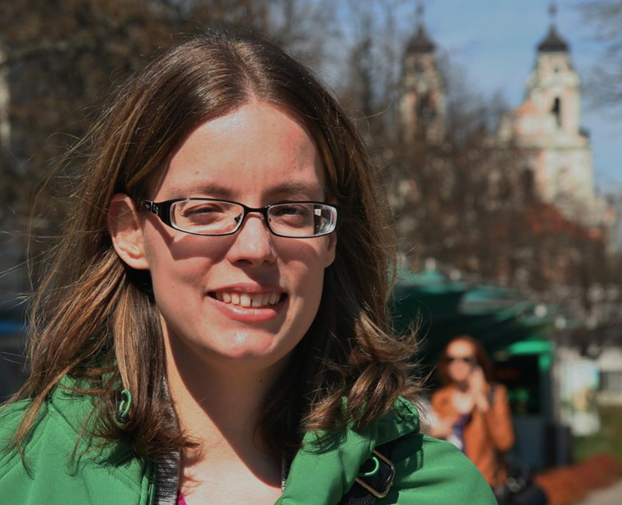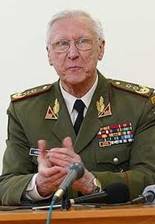Fri, 21st September, 2012 - Posted by 0df53x21 -
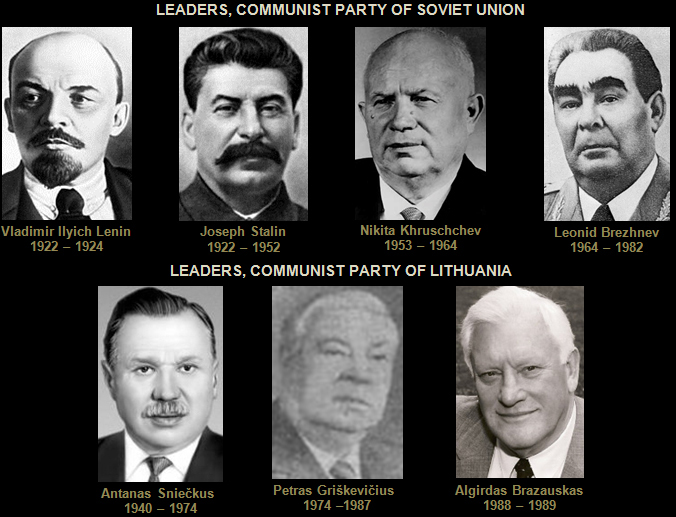
Important parliamentary elections are soon due in Lithuania. The party which leads in the polls had its origins in the Lithuanian Communist Party 20 years ago, and many believe that the nomenclature from those days still is very much alive in this party as well as in other parties of today. That modern, democratic governance is still not implemented and practiced. That corruption and personal gain is more important than the Lithuanian people's best. We hereby invite you to debate. Is the Lithuania nomenclature still alive?
Read more...
Fri, 21st September, 2012 - Posted by 0df53x21 -
FROM JUNE 2006
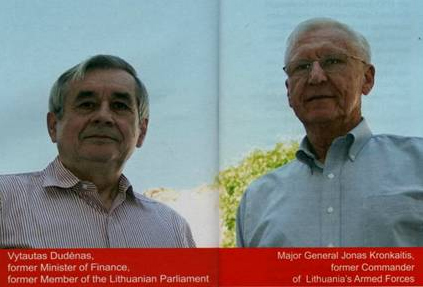
Major General Jonas Kronkaitis was Lithuania’s Vice Minister of National
Defense and Commander of the country’s armed forces for the period 1999 –
2004. Vytautas Dudenas was a member of the Lithuanian Parliament in the
1990s and later Minister of Finance for the period 1999 – 2000.
Both are now retired.
“Many of our Lithuanian politicians, civil servants, judges, the court system and the prosecutor’s office are still the children of the old Soviet ‘nomenklatura’, and there is a great need for fresh blood and new thinking in order for Lithuania to catch up with Western Europe.”
This said Jonas Kronkaitis and Vytautas Dudenas in 2006. Are they right, also in 2012?
Read more...
Tue, 18th September, 2012 - Posted by 0df53x21 -
Many Lithuanian historians continually choose not to understand, appreciate, and respect the impact and grandeur of Lithuanian history
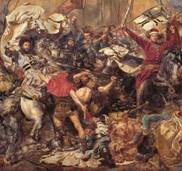 |
An article by Jon Platakis
Over 200 years of foreign occupations left our history suppressed, maligned, and if not stolen outright, then at least borrowed by our neighbors. One browses the internet, or leafs through history books and journals about Lithuania, and immediately notices our great Lithuanian names russianized or polonized; Lithuanian historical events are distorted in many versions, such as, Žalgirio Mūšis (Battle of Tannenberg or Grunwald) where descriptions of Vytautas’ participation is minimized or almost non-existent. It was mostly Lithuanian blood that was shed
Read the article and all comments…
|
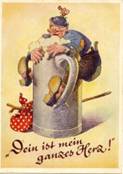 |
Bernard Terway:
Very good article. I am born of Lithuanian parents and proud to show my Lithuanicity (if there is such a word). I am also a retired teacher. It was always interesting to bring up the subject of Lithuania in my classes. Interesting because a huge percentage of the students, probably 99%, never even heard of Lithuania, unless they were avid basketball fans and knew of the basketball team. I put as much about Lithuania as I could in my classes, so at least the students were made aware of the fact that there actually was a country called Lithuania, there is a distinct Lithuanian language and culture. Living in Texas doesn't make it easy to push the Lithuanian identity - people here don't believe there is anyone or anything other than Texas in the world! Read more…
|
 |
Dr. E. Reilly:
An interesting polemical article. What is needed is a text by an author as authoritative & respected as say, Norman Davies or Robert Conquest, to write a definitive (well researched & documented) text: "The History of the Baltic Nations". A title such as this would include the histories of the Old Prussians and other pre-state groups, Lithuanians & Žemaičiai, Latgalians & Latvians (I do make a distinction), Livonians & Estonian groups, as well as the lost peoples: but then, one could not exclude immigrants such as the Scots & Irish (weavers), Germans, Swedes, Old Believers & post-WW2 influx. And then there are the various periods of imperialist aggression from Moskova, Berlin, Karków & even Stockholm to be accounted for. The region's complexity defies simple narratives and assertions. Read more…
|
 |
Jon Platakis:
English historian, S.C. Rowell has written extensively about Lithuania and the Baltic states during the medieval period, and it would appear that he far exceeds the respect and authoritativeness in this regard of Norman Davies or Robert Conquest.. Rowell's book, "Lithuania Ascending: A Pagan Empire Within East-Central Europe" provided some of the impetus for writing this article. Read more…
|
 |
B. Kolubinski:
I’m Polish. I have a great respect for the Lithuanian people and Lithuanian history. That’s why, I is not easy to read, that you may treat the 400 years our common history as your occupation. It was the most successful period in the history of our two nations (as always, there were also some difficult issues). Please, visit Krakow. Lithuanian-origin kings were living there and created one of the most beautiful cities in Europe. It is mainly, you Lithuanians, who did it. Please, compare amazing Vilnius to Ryga or Thalin, or to the other cities created by Russians, Germans or Scandinavians for whom the Baltic States were only another territories. You should be proud of your history, our common history. Read more…
|
 |
Vytautas Sliupas:
To Mr. B. Kolubinski
I do thank you for your expressed welcome and friendly attitude toward Lithuanians, which is so lacking among my Polish acquaintances. On the question of "occupation" I wish to refer you to two books: First one, the 1911 Polish language "Lenku Apastalai Lietuvoje", by Canon (Kanauninkas) K. Prapuolenis. This issue later in 1913 was translated into Lithuanian and several other languages. The second one, the 2011 entitled "Lenku Skriaudu Lietuviams Istorijos Apzvalga", by Dr. Algimantas Liekis. Read more…
|
 |
Vytautas Sliupas:
To Dr. E.Reilly
I agree with your suggestion on the need of inviting authoritative and respected authors to write a well documented text on the "Baltic Nations". Back in 1988-89 I corresponded with Dr. Norman Davies, author of "Poland: God's Playground", and asked to write a similar book about Lithuanians. In his original book a large portion dealt with Lithuanian history. He was agreeable to that task. However, in spite of him having a thorough research already done, he wanted to be hired at an "astronomical" salary, which was beyond our means. Read more…
|
 |
Boris Bakunas:
To Mr. B. Koblunski:
First, let me acknowledge your appreciation of Lithuanian-Polish cooperation in establishing the one of the most powerful states in Europe during the 16th and early 17th centuries. Currently, Lithuania and Poland are again partners and allies in the European Union and NATO. I hope that this cooperation between two neighboring countries whose histories were intertwined for several centuries continues in an atmosphere of mutual respect and tolerance. Read more…
|
 |
Ruta Lee:
A beautiful soul, mind, heart and eyeful of information......as are the commentaries! Many Thanks for opening the subject of LITHUANIA to the world! Read more…
With admiration
Ruta Lee
|
 |
Angele Jureviciene:
Very good article. Our people have to be proud of. We must preach the word of truth and to return our nation of its glorious past. I think that the most important tocol has made our nation the greatest thing that saved his property-the language, the very oldest language in Europe. Or maybe the world? The Lithuanian tongue , for example , is in many strikingly similar to Sanskrit . The philosopher Emmanuel Kant , philosopher ( he has Lithuanian roots ), who knew nothing of Sanskrit , was amazed of scientific structure of Lithuanian language… Read more…
|
 |
Vijole Arbas:
Thank you -- I would appreciate a campaign to convince the tour guides at Wawel Castle in Krakow to pronounce and expoud -- King of Poland and Lithuania -- they keep on forgetting our Republic of Two Nations
Read more…
|
Read more...

Wed, 15th August, 2012 - Posted by 0df53x21 -
Where are the new ideas for Lithuania?
Are these the top 14 throughout history?
|

|
1200s
King Mindaugas’ grand idea was to found the Lithuanian State!
Lithuania’s only king is also credited with stopping the advance of the Tatars towards the Baltic Sea and Europe, establishing international recognition of Lithuania, and turning it towards Western civilization.
|

|
1300s
Grand Duke Gediminas’ idea was to found Vilnius as one of the World’s leading and tolerant cities
Gediminas was also the true founder of ‘The Grand Duchy of Lithuania’. He was a man of extraordinary knowledge and wisdom, offering free access into Lithuania to Europeans of every order and profession.
|

|
1400s
Vytautas the Great’s idea was to expand
‘The Grand Duchy of Lithuania’ to the Black Sea
Vytautas the Great was the Grand Duke expanding the Grand Duchy‘s frontiers from the Baltic Sea south to the Black Sea and thereby creating the by then largest country in Europe. The Grand Duchy was at its largest by the middle of the 15th Century.
|

|
1500s
Sigismund the Old’s idea was to connect Italy and Lithuania, with the help of Leonardo da Vinci!
When Lithuania’s Grand Duke, Sigismund the Old in 1518 married the Italian Princess Bona Sforza, this became an outstanding manifestation of the already strong relationship between Italy and Lithuania. The royal couple created together an Italian community within the court and Italian culture became the preoccupation of the Vilnius city elite.
|

|
1700s
The Great Gaon’s idea was to develop the Jewish society that made Vilnius the intellectual cradle for Jews all around the world
The Great Gaon of Vilnius, Elijahu ben Solomon Zalman (1720-1797) was the greatest luminary not only among the many Talmudical scholars of the 17th and 18th centuries, but also for many later generations.
|

|
1875-1911
Čiurlionis’ idea was to describe Lithuania’s soul in his art and music
During his short life Lithuania’s national composer and painter, Mikalojus Konstantinas Čiurlionis, composed about 250 pieces of music and created about 300 paintings. His works have had a profound influence on modern Lithuanian culture.
|

|
1918
Antanas Basanavičius’ grand idea was to reclaim independence for Lithuania
As a member of the Council of Lithuania he was a signer of the Act of Independence of Lithuania on the 16th of February 1918 (signed in the building at the picture to the left). Basanavičius is often given the unique informal honorific title of the "Patriarch of the Nation".
|

|
1918-1940
President Antanas Smetona had the idea of again making Lithuania a successful, remarkable nation
Smetona was undoubtedly Lithuania’s most important
political figure between the two wars. He served as President from 1919 to 1920, and again from 1926 to 1940. Smetona was also one of the famous ideologists of nationalists in Lithuania. The country was truly flourishing under his presidency.
|

|
1945-1990
Lithuanians who were forced to leave their home country had the idea of keeping on fighting
The post World War II wave of Lithuanian immigrants experienced a surge of Lithuanian consciousness. They saw themselves as exiled communities and clung to their memory of two decades of freedom in Lithuania. They also made numerous efforts to support Lithuania’s freedom fight.
|

|
1945-1990
Lithuania had the idea to improve its infrastructure even during Soviet years
Despite huge post war difficulties, Lithuania managed to build around 450 km of four-lane motorways from Vilnius to Klaipėda and Panevėžys. Result? Lithuania got the best roads in East Europe! At the same time Klaipėda port was developed as a leading Baltic transport hub, connecting East and West..
|

|
1960-1990
Despite the oppression, Lithuanian experts had the idea to make Lithuania the Soviet Silicon Valley
Still today Lithuania is a world leading exporter of femtosecond lasers. Among the clients is NASA, using Lithuanian laser technology for analyses of minerals on Mars! A country of 3.2million people, Lithuania, has about 15 laser producers, employing about 300 laser specialists!
|

|
1988 – 1991
Professor Vytautas Landsbergis had the idea that his masses of unarmed Lithuanians could win over the mighty Soviet army
Hadn‘t it been for this peaceful fight by Landsbergis and his people for regained freedom against an occupation and a ruling the people of the Baltic States never wanted or agreed to, the map of Europe would most likely have looked very different today...
|
 
|
1990 – 2010
Post Soviet Lithuania’s sport and culture had the idea to remain on world level
I let two of the most prominent figures within these fields represent the fantastic flora of ideas and pure guts sport and culture is playing for Lithuania; Music Professor Donatas Katkus (left) and former basketball player Arvydas Sabonis. Remarkable!!
|

|
2000 – 2010
The idea of Vilnius Mayor Arturas Zuokas’ was to build Lithuania’s Manhattan, the new office district
Vilnius’ Mayor, Arturas Zuokas, earned his place in Lithuania’s history with his energetic efforts to build a new skyscraper city within the city.
|
 
|
2012 – 2020
President Dalia Grybauskaitė
Prime Minister Andrius Kubilius
Please let us know what are your ideas and visions for the future development of Lithuania.
NEW IDEAS, NEW SPIRIT IS VERY MUCH NEEDED!
|
Read more...

Mon, 23rd July, 2012 - Posted by 0df53x21 -
New concept for seniors, planned in Vilnius
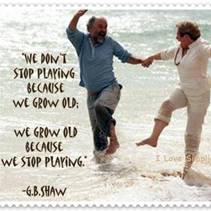
A new concept for senior apartments, with focus on warmth, dignity and joy. Custom apartments around an outdoor, enclosed patio - plus a large, common 'lobby' for food, reading, music, good talks, therapy, training and more.
This is what now might be develop in the outskirts of Vilnius, about 20 minutes drive from the Old Town and less than five minutes from the Le Meridien Hotel, with its beautiful pool, spa complex, and a great new 18-hole golf course.
The plan they have under consideration right now is to build an elegant senior complex on the site, for potential buyers both in this country and from abroad.
Quality and service will be very high, still at prices one can hardly dream of the United States, Western Europe or Australia.
The planned complex will consist of around 50 apartments and a large public centre-building that can best be compared with an international hotel lobby.
All apartments and common areas will be wheelchair accessible. The latest of 'welfare technology' will be installed, and there will be an extensive range of health care measures, safety, activities and a good, warm relationship with other seniors in similar circumstances.
If sufficient interest from potential buyers, the project is expected completed in 2014.

When will this project be completed?
When will this project be completed? What provisions will there be for handicapped, when we grow older and unable to participate in sports or other activities?
Vytas
_________________________
Sounds like a great project
It sounds like a great project hope to hear more about it.
Irene
_________________________
I think something like that could be very welcome
Actually, I think that something like that could be very welcome. What it will need is an inexpensive and convenient form of transportation to and from Vilnius center and old town. So, I hope that the organizers will think about that. Today, it is quite expensive to get to Le Meridien Hotel and the hotel shuttle bus only goes as far as the White Bridge for some strange reason. Public bus is just to going to be acceptable for residents. A taxi ride costs over 100 lita round trip today and that will be much higher by the time this opens.
Without a convenient, affordable form of transport, residents will feel very isolated out there. With that problem solved, I could see a good interest in it.
Gene
_________________________
Many "seniors" prefer to not be alone. They are still active "seniors," and a place like this offers safety, security, a sense of community
Many "seniors" prefer to not be alone. They are still active "seniors," and a place like this offers safety, security, a sense of community, and if I were anywhere near retirement age, I would surely consider such a residence!!! Great Idea!!! :)
Jenifer

Read more...

Sat, 14th July, 2012 - Posted by 0df53x21 -

Wed, 11th July, 2012 - Posted by 0df53x21 -

Rūta Bražiūnienė
HEALING WOUNDS BETWEEN LT-AMERICANS AND HOMELAND LITHUANIA
Our debate topic in VilNews Forum, with the above headline, has now attracted more than 200 comments. Here is one of the posts, written by Rūta Bražiūnienė:

While I noticed that the above 156 comments argue about passports, I just have an issue with the first post, that I have not noticed be addressed, yet. "Many here in Lithuania still believe that those who left, whether for economic or political reasons, had very comfortable lives compared to those who stayed behind and had to fight through several decades of inhuman oppression and abuse by the Soviet occupiers."
I totally assume, based on my own previous experience, that people who think that those who left Lithuania had a comfortable life, are sadly mistaken. My parents fled within hours of occupation. They saw close relatives, neighbors, friends be killed by Soviets. They fled to save their lives.
It's hard not to generalize, as we all seem to do that quite well. That generation, who had to make decisions to flee, thought that they would be back in days. Then weeks. Then months. And before they knew it, years passed. They lived in DP (displaced person) camps. There was no luxury there.
Read more...

Sat, 21st April, 2012 - Posted by 0df53x21 -
The book, "1939, The Year that Changed Everything in Lithuania's History” reveals the unflattering response by the top leadership, their abdication, and flight from the nation, leaving the population defenseless... without any responsible and effective resistance… as if independence never happened

Book author: Sarunas Liekis |

Tony Mazeika |
In a comment to our VilNews article series "Lithuania and the Soviet Union 1939-1940" ( Section 10 - HISTORICAL LITHUANIA) Tony Mazeika from Mission Viejo in California writes the following:
"It is necessary to read the full account of Lithuania's leadership response to Soviet demands and occupation in 1940. The book, "1939, The Year that Changed Everything in Lithuania's History", Arnas Liekis, reveals the unflattering response by the top leadership, their abdication, and flight from the nation, leaving the population defenseless...without any responsible and effective resistance. It's as if independence never happened. Lithuania, together with Latvia & Estonia, make no formal military resistance knowing that Finland fought in 1939-1940 and survived a Soviet onslaught. Much more need to be disclosed about those "patriots" who chose to run rather than fight for their nation."
-----------------------------------------------------------------------------------------------------------------------------------------------------------------
Our VilNews Associate Editor, Vin Karnila, has edited the four articles we have presented on the topic "Lithuania and the Soviet Union 1939-1940" from the personal memoirs of Juozas Urbšys. Here is his response to Mr. Mazeika's commentary:
Easy to say that they should have organized formal Military resistance – and get slaughtered
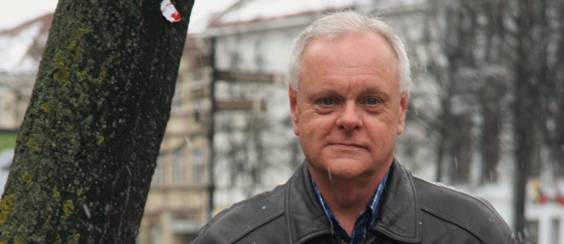
Vin Karnila
I would like to thank you Mr. Mazeika for sharing your thoughts with us and making us aware of what I'm sure is a very interesting book written by Arnas Liekis.
You bring up a topic that has been discussed many times throughout the years following 1940. The members of the Lithuanian delegation that were involved in the negotiations with Russia have always claimed that they knew that Russia at any time they chose could have invaded Lithuania. They also felt that if Russia did in fact invade, whether there was organized military resistance or not, this would result in catastrophic consequences for Lithuania and its people. Throughout the negotiations they said that what they were trying to achieve was the best possible outcome for Lithuania. In the end what they achieved was the best possible outcome that Russia would allow.
The topic of the courageous people of Finland and their organized military resistance to Russia's invasion of their homeland in relation to the fact that Russia's invasion of Lithuania in 1940 occurred without a shot being fired has also been discussed many times. The question remains how much did Lithuania know or did not know about Finland's armed resistance to Russia in what is known as the "Winter War"?
3 October 1939 the Lithuanian delegation flew to Moscow to begin the negotiations with Russia. 30 November 1939 Russia attacked Finland to begin the "Winter War". By March of 1940 both sides began to negotiate a peace treaty. Did Lithuania know that in spite of the great courage of the Finns the primary factor in Finland's success was that the Winter War was fought in some of the harshest of winter weather conditions and in equally harsh terrain? This harsh terrain the Finns knew like the back of their hand and the weather conditions to them was normal winter weather? Did Lithuania know that if Russia attacked across the gentle rolling hills and flat farmlands of Lithuania in spring or summer that the advantage of weather and terrain, that so greatly helped the Finns, would only make Russia's evil task easier? An invasion of Lithuania by Russia in the spring or summer of 1940 would have been a military situation completely the opposite of the Finland's and Russia's Winter War. Did Lithuania know that whatever peace agreement Finland and Russia came to that it would end up being short lived? Had Lithuania taken notice of the fact that no Western power had come to Finland's aid with any meaningful support? From all reports, Lithuania realized that their Military, no matter how courageously they fought, was no match against the might of Soviet Russia's army.
Many comments have been made and questions asked about the large number of government and Military top officials that left after 15 June 1940. Why didn't they stay? Why didn't they stay and resist? How could they leave their homeland? I would say that the real answers to these questions can only be answered by these top officials that left. Some left almost immediately as if they knew what would happen once Russia occupied the country. Others left after they saw what Russia was doing now that they occupied the country. In fact many people that had the means to do so left once they understood what their future would be at the hands of Russia.
All these questions to all these situations I have asked myself over and over. Again and again I come to the conclusion that more than seventy years after these events occurred, while I'm sitting in the comfort of my home and while I can walk the streets of Vilnius without (for the time being) having to worry about being run over by a Russian tank, shot by a Russian soldier, kidnapped by the NKVD, put in a gulag or executed, I am really not in a position to judge people who were trying to do the best they could for our country and simply trying to survive during very difficult and dangerous times. I guess it could be kind of easy for some to say that they should have organized formal Military resistance – and got slaughtered. It could also be easy for some to say that the top officials and the people of means should have stayed – and got executed, imprisoned, put in gulags or sent to Siberia. Personally I can't judge these people for their actions because I wasn't alive then and I wasn't involved in these dangerous and difficult times. I also refuse to be a "Monday morning quarterback" and go on and on talking about all of the "should haves" for the same reasons I just stated. The opinions of others about these matters though are something I am very interested in.
Having said all this I must say that the discussion of what happened, what did not happen, why it did happen and why it didn't happen during these times are matters that will continue to occupy my thoughts – I'm still trying to understand and make sense of all of it. Again I would like to thank you Mr. Mazeika for sharing your thoughts with all of us and I would also like to thank you for letting us know about the book by Arnas Liekis - 1939, The Year that Changed Everything in Lithuania's History. I'm sure that I am not the only one out there looking for more information about this period of Lithuania's history and I'm sure that I'm not the only one looking for more information about this so that I can try to make more sense of everything.
Dear readers, I'm sure that Mr. Mazeika and I are not the only ones out there that are interested in what happened during these times and we are not the only ones with opinions. We would please invite you to share information and your opinions on this topic with all our readers throughout the world. I'm sure this is something we all are trying to understand better.
Su pagarbe
Vin Karnila
Associate editor
---------------------------------------------------------------------------------------------------------------------------------------
Aleksander Stulgisnkis, Lithuania’s President between 1921 and 1926, decided to stay in his homeland even when the Soviet’s attacked in 1940... He paid a high price...
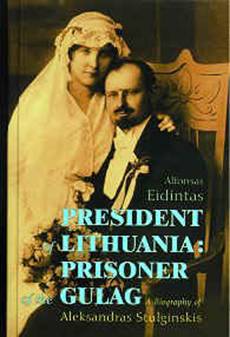
Cover of the book by Dr. Alfonsas Eidintas, “President of Lithuania:
Prisoner of the gulag (A biography of Alexander Stulginskis).”
Aleksandras Stulginskis, the first constitutional president after Lithuania had declared its renewed independence on 16 February 1918, was kidnapped at his home by Stalinist forces in June 1941 and deported to a Siberian Gulag. After he was released from the inhuman captivity, he was still for years forced to live in Siberia’s deep forests, until 1956.
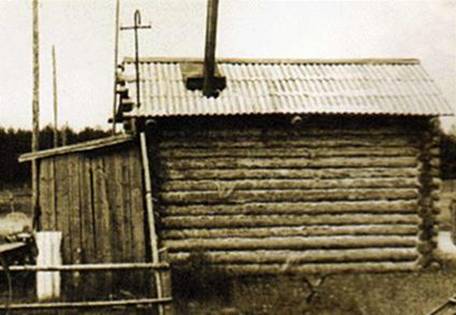
Lithuania’s President Aleksandras Stulginskis built this Siberian log cabin by his
own hands, living here with his wife Ona until 1956.
How could it be that a former head of state of a free and independent country could be kidnapped in his own home and taken around half the globe to imprisonment in a labour camp where cruelty and inhumanity were the principal characteristics?
How could it be that the rest of the world chose to ignore such an assault against a splendid leader who proudly had been fighting for democracy and independence in a nation that before the Second World War was fully on par with its neighbours in Scandinavia and Northern Europe, both economically and as an independent state?
Just think of what would have been the reactions from the international community if one of the other state leaders from the 1920s had become victims of such a cruel abuse?
Read more at https://vilnews.com/?p=6539
Read more...

Tue, 17th April, 2012 - Posted by 0df53x21 -
Cultivating Lithuanian unity world-wide:
What YOU can do!

Boris Vytautas Bakunas
By Dr. Boris Vytautas Bakunas, Ph. D., Chicago
A wave of unity swept the international Lithuanian community on March 11th as Lithuanians celebrated the 22nd anniversary of the Lithuanian Parliament’s declaration of independence from the Soviet Union. However, the sense of national unity engendered by the celebration could be short-lived.
Human beings have a strong tendency to overgeneralize and succumb to stereotypical us-them distinctions that can shatter even the strongest bonds. We need only search the internet to find examples of divisive thinking at work:
”50 years of Soviet rule has ruined an entire generation of Lithuanian.”
”Those who fled Lithuania during World II were cowards -- and now they come back, flaunt their wealth, and tell us ‘true Lithuanians’ how to live.”
”Lithuanians who work abroad have abandoned their homeland and should be deprived of their Lithuanian citizenship.”
Could such stereotypical, emotionally-charged accusations be one of the main reasons why relations between Lithuania’s diaspora groups and their countrymen back home have become strained?
As psychiatrist Dr, Aaron T. Beck and others have noted, accusatory remarks are often perceived as threats by those targeted for verbal attack. Recriminations follow and escalate into verbal shooting matches that solidify hostilities between individuals and groups that previously enjoyed friendly relations.
Although debate is an inevitable and even desirable characteristic of free democratic societies, inflammatory finger-pointing can undermine a country’s national cohesion, political stability, and economic development. As individuals, what can we do to curb the spiral of anger-promoting speech that has surfaced within the world-wide Lithuanian community?
Read more...
Comments

Jon Platakis
A poignant article that touches on the root causes of bias and discrimination. Throughout Lithuanian history, the Lithuanian people showed unity, determination and resiliency to overcome 200 years of foreign occupations that, once again, resulted in a free and sovereign nation. Today, it is only through unity, determination and resiliency by Lithuanians, in Lithuania and abroad, that Lithuania can move forward and reclaim her place on the world stage.
Although, physically, Lithuanians may live oceans apart, pushing each other further away only hinders the progress of the Lithuanian nation. As this article points out, cultural promotion and exchange between all Lithuanians can solidify and preserve our national identity. Organizations, such as, the National Lithuanian Hall of Fame, and the newly established Lithuanian-American Theater "Viltis" seek to promote Lithuanian culture in America, and at the same time, reach out and recognize achievements of Lithuanians in Lithuania.
One only has to look at history to learn that peoples united for a purpose or cause will always achieve their goals.

Sandy
Very interesting

Mary Ellen Lloyd
Why would there be ANY political differences among Lithuanian-Americans, at least for those over age 40 who are fully Lithuanian?? Do actual Lithuanians who lived under communism support any party which proposes to do the same thing to America that Russia did to Lithuania?? HOW can there be political divisiveness among Lithuanians who were old enough to witness the terrors and the gulags?

Boris Bakunas
One of the outstanding features of VilNews is how it publishes articles highlighting the achievements of Lithuanians around the world as well as the harsh realities of the past.
In 2011, two highly-acclaimed novels about the horrors of Soviet oppression were published. "Between Shades of Gray" by Ruta Sepetys told the story of a fifteen-year-old girl who along with her family was exiled to Siberia. Both hard-cover and paperback editions of "Between Shades of Gray" hit the New York Times best-seller list..
Antanas Sileika's novel "Underground" depicts the armed resistance of the Lithuanian partisans against the Soviet invaders and their collaborators. "Underground's" Lukas, is based on Lithuania's most famous partisan, Juozas Luksa--Daumantas. :"Underground" was picked as on of the best novels in English published in 2011 by The Globe and Mail. I have heard that the United States edition of Sileika's novel will be published within a few weeks.
2011 also saw the publication of Ellen Cassedy's book "We Are Here," which recounts the author's personal quest to understand how the people of Lithuania -- Jews and non-Jews -- are dealing with the horrors of the Nazi and Soviet past in order to build a new and better future. Ellen was inspired to write her book when her uncle, a Holocaust survivor, gave her a slip of paper and said, "Read this."
All three books, written by children of Lithuanians who escaped execution or exile, are helping to acquaint English-speaking public with one of the most tragic and heroic periods of Lithuanian history. They will also help educate a new generation of Lithuanians about the long suppressed history of Lithuania during and after World War II.
I am very happy that The National Lithuanian Hall of Fame is playing such an active role in helping to publicize all three books. This new organization has already donated more than five thousand dollars to help Lithuanian film director Tomas Donela secure the film right to "Underground." It is also making great progress in getting "Between Shades of Gray" on the reading lists of American schools and doing all it can to promote "We Are Here."
How can there be any divisiveness among Lithuanians in regards the terrors of the Gulag and the Holocaust? I don't have an answer to that question. I only know that during my own long life I have encountered several. I've spoken to and interviewed Lithuanians who collaborated with Nazis and with Soviet Communists. I've heard expressions of anti-Semitism, and I've heard several Lithuanians express nostalgia for the "good old days" under Communism. Probably, I'll never fully understand the dark side of human nature. But I also spoke to former partisans, political prisoners, and those who endured Siberian exile. My hope is that as individuals we do all we can to overcome hatred in word and in deed and help each other when we can.
In this endeavor, perhaps we can learn from the example set by South Africa's Truth and Reconciliation Commission. As Archbishop Desmond Tutu has said, "“Forgiving is not forgetting; its actually remembering--remembering and not using your right to hit back. Its a second chance for a new beginning. And the remembering part is particularly important. Especially if you dont want to repeat what happened.”
Read more...

Sun, 12th February, 2012 - Posted by 0df53x21 -

“DOUBLE GENOCIDE” |
The "Double Genocide theory" is a concept about the equality of the Holocaust and Communist crimes against humanity. The term was used by associate professor of political science Dovilé Budryté in 2004 in a study of Lithuanian memory politics with regard to Soviet and Nazi repression, where the view held by a segment of that country since before the restoration of independence in 1991 was that Lithuanians similarly suffered genocide under Soviet rule. Recent critics of this Lithuanian viewpoint, Dovid Katz and Efraim Zuroff, have argued that the country has presented a false “double genocide” thesis and its argumentation obfuscates the Holocaust.
------------------------------------------------------------------------------------------------------------------------------------------------------------------------

Roger Cohen |
 |
‘The Suffering Olympics’
By ROGER COHEN
Published: January 30, 2012
VILNIUS, LITHUANIA — The “double genocide” wars that pit Stalin’s crimes against Hitler’s are raging in wide swathes of Europe and every now and again along comes a gust from the past to stoke them. The 70th anniversary this month of the Nazi adoption at Wannsee of annihilation plans for the Jews provided one such squall.
Yes, the past is still treacherous beneath Europe’s calm surface. Memory swirls untamed in the parts of the Continent that the American historian Timothy Snyder calls “Bloodlands,” the slaughterhouses from Lithuania to Ukraine that Hitler and Stalin subjected to their murderous whim.
To mark the Wannsee anniversary, over 70 European Parliament members, including 8 Lithuanians, signed a declaration objecting to “attempts to obfuscate the Holocaust by diminishing its uniqueness and deeming it to be equal, similar or equivalent to Communism.” It also rejected efforts to rewrite European school history books “to reflect the notion of ‘double genocide.”’
All of this was too much for the Lithuanian foreign minister, Audronius Azubalis, a conservative, who blasted the Lithuanian social democrat signatories as “pathetic.” His spokeswoman declared that the only difference between Hitler and Stalin was the length of their mustaches. She said legal qualifications of the crimes they committed were “absolutely the same”: genocide, war crimes and crimes against humanity.
Read more...
------------------------------------------------------------------------------------------------------------------------------------------------------------------------
Three major flaws mar
Mr. Cohen’s attempt

Boris Bakunas
By: Dr. Boris Vytautas Bakunas, Ph.D.
"Mr. Cohen may appear to make a sincere effort to present a balanced view in his article; however, three major flaws mar his attempt. First, the article is based on the logical fallacy of false dichotomy, also known as the either-or fallacy. Second, the scales of balance in Mr. Cohen’s presentation waver as a result of his failure to present all the relevant facts related to the establishment of The Museum of Genocide Victims in Vilnius. Finally, Mr. Cohen obfuscates two crucial terms: Holocaust and genocide.
Read more...
------------------------------------------------------------------------------------------------------------------------------------------------------------------------…
Read more...

Sat, 26th November, 2011 - Posted by 0df53x21 -
The land of smiles
or tears?
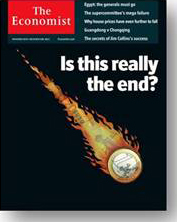
The Economist’s (London) image
shows the euro as an asteroid,
plummeting to earth. |
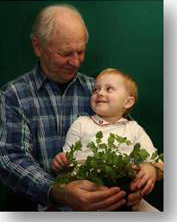
The editor's photo was meant to
illustrate that humanity has a
bright future ahead. |
In the recent issue of VilNews I wrote that I do not share the pessimists gloomy predictions for the world's future, as I think the crisis is part of a necessary cleansing process. I am optimistic because I see that a whole new type of people is coming. New leaders. Many of today's children and young people.
What I see is forward-looking youngsters with good balance within themselves and their 'other dimension'; their divine origin.
I believe that ‘The land of smiles’ is under development. That new kids, a new human type, seem to have come to Earth with a special mission: to assist the Earth and its inhabitants in the transition and the 'rebirth' as a planet with higher awareness and better interpersonal understanding.
Aage Myhre
Editor-in-Chief
You are all welcome to participate in this discussion!
 |
Many believe that we will be entering the Age of Enlightenment within the next five years… Others believe that we have already begun to make this transition
This week in the Friday News Minute we look at Conscious Leadership in article from Lisa Berg, a colleague and friend, and President of Global Bridge Productions. Lisa’s article highlights an important part of our workplace transference from the Information Age to the Age of Consciousness, also called the Age of Enlightenment. Many believe that we will be entering this next evolutionary stage within the next five years…others believe that we have already begun to make this transition.
The time has come for us to move past the illusion of separateness
Conscious leadership calls for inclusivity, multidimensionality, intergenerational and interdisciplinary focus and common experience that goes beyond boundaries of rank, belief systems or nationality and touches the core of who we are.
What can we do to reach this level of inner and outer harmony that comes through collective efforts rather than conflict? What do wisdom traditions offer that is relevant in our modern world?
Listen from the heart to what has meaning and lead from there. As a cross-cultural consultant I work with hundreds of corporate employees working internationally.
Rather than judge one another, we teach our clients to go beneath the surface of a behavior that differed from their own to find deeper meaning. This led to under-standing and acceptance, more productive negotiations and perhaps even a shared knowing.
For example, when a Japanese business man is silent, it is wise to note that the Japanese listen to the ‘hara’, the belly, for information rather than use superfluous words and explanations. Not rushing into an answer is wise. We can learn from each other, if we take the time to slow down enough to listen.
Appreciate what I call the Three Points of Connection: Nature, Humanity and Universal Wisdom. In the beautiful rice fields of Bali, Indonesia stands a shrine. The farmer is reminded of his connection to his fellow human beings, to Nature and to the Spirit world. The Balinese give offerings throughout the day to the Gods. The peacefulness in the air is palpable. There is a feeling of generosity and oneness. And lots of smiling.
When leaders and citizens remember to appreciate the Three Points of Connection, everything else will fall into place. We will know, from deep within, that to care for our environment is not only a privilege but natural because as we care for the earth we care for ourselves. We will know that going beyond boundaries of difference and age-old conflict enables us to make peace with our neighbors and co-create a world where children live happily and healthfully. And, when we return to source as the partner in creating our world, we will not falter in our ability to move towards a positive future that is inclusive of all sentient beings, as the great mystical traditions teach.
Creating a harmonious and inclusive future takes a village.
Gather small groups in your organization and begin to listen deeply to each other. Better yet, take a walk outside and commune with Nature. Give thanks for the beauty that surrounds you and take time to smell the roses. All things will go smoother from there.
Jurate Kutkus Burns, Florida. |
 |
You brighten up my day
Dear Aage,
A very interesting article with a lot of insight regarding divinity and where we are heading, in this cosmic time of transmission to the age of Aquarius! You brighten up my day with very positive forecast.
Hans Gyllenhammar, Swedish Ministry for Foreign Affairs.
|
 |
The next generation will have a healthier more sustainable future because of the massive restructuring and pain we will have to endure in this past generation
Well written - The next generation will have a healthier more sustainable future because of the massive restructuring and pain we will have to endure in this past generation. The United Nations unveiled yesterday its theme for its Conference on Sustainable Development, or Rio+20 in June 2012 : "The Future We Want – Launching a Global Conversation" (http://www.uncsd2012.org/rio20/index.php?page=view&nr=458&type=13&menu=23). This will likely be the largest conference on sustainability for this generation.
Sustainability as Bruntland defined it 40 years ago involves 3 pillars : economic , social and environmental. I hope Lithuania will participate and help define “ The Future we want “- one that includes international collaboration, improved social cohesion , remembering the sins of our fathers and building bridges to improving relationships between religious cultures and continents. The economic pillar needs work and I believe that Lithuania can be a model for smaller countries to promote it through strategic trade relationships and a connection with its scientific community.
Professor Vic Pakalnis, Kingston , Ontario Canada
|
 |
We fear that without urgent action by the ECB, the euro will crash, doing untold damage not just to Europe but to the entire world economy
I have never seen anything even remotely as bad in over 3 decades of my research! The signs are bad: debt markets are freezing up, as they did before the collapse of Lehman in 2008. Even a German bond auction flopped this week. We fear that without urgent action by the ECB, the euro will crash, doing untold damage not just to Europe but to the entire world economy.
Denial is not just a river in Egypt!
The Economist (London) Daily Chart:
38% of the EU Population suffers from a diagnosable Mental Illness. Drug Abuse and Drug Addiction are common, garden-variety Mental Illness. Drug abuse reflects the underlying mental health of a population. Left out are far more common abuse agents: Alcohol, Guarana, and....
http://www.economist.com/blogs/dailychart/2011/09/europes-mental-health
Dr. Val Samonis,
The Web Professor of Global Management, USA/Canada
|
Read more...

Tue, 8th November, 2011 - Posted by 0df53x21 -
Holocaust in Lithuania
Some time ago a reader in the USA wrote the following one-sentence ‘letter’ to the editor of VilNews:
"May Lithuania rot in hell for a 1000 years."

This ‘letter’ resulted in several posts and comments from our readers around the world. We in the editorial team have been very impressed by how informative and balanced most of the posts have been. Probably it is this kind of open, intelligent debate that is needed to build bridges across the gap that emerged in the relationship between Jews and Lithuanians during and after World War II. We thank all who participate, not least the following four: Olga Zabludoff, Donatas Januta, Didier Bertin and Yves Plasseraud:
…
Read more...

Mon, 31st October, 2011 - Posted by 0df53x21 -
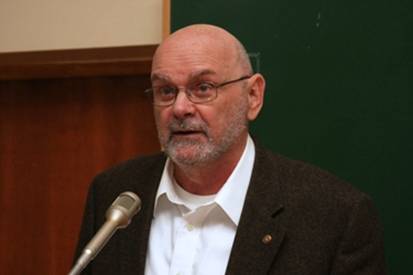
Dr. Saulius Suziedelis.
Scholar of Lithuania’s Holocaust history.
Photo: www.komisija.lt/lt/naujiena.php?id=1301995164
By Ellen Cassedy
“The only way for Lithuanians to lighten the difficult history of 1941 is to embrace it.”
The writer of these words, Dr. Saulius Suziedelis of Millersville, Pennsylvania, USA, will be honored in Vilnius on November 18, 2011, by the Lithuanian Ministry of Education and Science.
Also receiving awards will be Dr. Vytautas Cernius, a longtime professor of education at Temple University in Philadelphia, Pennsylvania, and Dr. Arvydas Kliore, a space scientist with NASA. The prizes for intellectual achievement are awarded annually to Lithuanians living abroad.
Read more...
Mon, 31st October, 2011 - Posted by 0df53x21 -
Other responses to the 26 October comment from Mr. Januta

FROM: Alexander (26 October)
Well said. I just wish those who write about Lithuanian-Jewish relations and blame all Lithuanians for the killing of Jews, would get their true facts before writing.

FROM: fdfdg (26 October)·
An outrageous pack of lies.
The Jews in Lithuania were murdered by ethnic Lithuanian volunteers. Lithuanians are still trying to hide this fact after 60 years, from themselves, their children and now they are attempting to impose this false history on the world at large. Dov Levin isn't positing double genocide, there is no equals sign there. "Double genocide" is not the name the Lithuanians give to their own policy of Holocaust obfuscation, but it's an accurate name. The number of Lithuanian perpetrators is in the tens of thousands, and those are just the active shooters. If you want to get into passive support for genocide, it's much higher. There was no specifically Lithuanian Waffen SS, because the Lithuanians created their own pro-Nazi formations before the Nazis got around to it, TDA, LAF etc etc. and these forces were involved in the Holocaust in Poland, Ukraine, Belarus and elsewhere, besides their native Lithuania. The author is obviously fooling himself into thinking it's possible some Lithuanians were fooled into it at German direction, but the LAF was a Lithuanian organization, not a German one, and their underground cells of ethnic Lithuanians inside Lithuania (LAF was pretending to be the government in exile in Berlin) got the orders from HQ: prepare to slaughter your Jewish neighbors as soon as Soviet-German hostilities break out. Didier Bertin's point concerning the supposed Soviet genocide of Lithuanians was not that some Lithuanians survived, it was that not only did the vast majority survive, their population actually increased during the supposed genocide. This is an outrageous pack of lies by another Lithuanian Holocaust obfuscator.

FROM: Richard Vitkauskas (26 October)·
Excellent article Donatas. Many thanks
Mr. Januta’s response

FROM: Donatas Januta (27 October)·
Dina Porat, a respected Israeli historian estimated that the total number of Lithuanians, involved directly and indirectly, in the German organized killing of Jews was up to 15,000, i.e., about 0.5% of the population
For those who may want a little perspective on fdfdg’s preceding comment. He states that my article is “an outrageus pack of lies”, and specifically he then says: “The number of Lithuanian perpetrators is in the tens of thousands, and those are just the active shooters.” Dina Porat, a respected Israeli historian estimated that the total number of Lithuanians, involved directly and indirectly, in the German organized killing of Jews was up to 15,000, i.e., about 0.5% of the population. And Arunas Bubnys, another historian, has estimated that those directly involved, i.e., what fdfdg refers to as “the active shooters”, was somewhere between 2,000 and 3,000. But according to Mr. or Ms. fdfdg, both of these historians are just liars. Judge for yourselves the rest of fdfdg’s remarks.…
Read more...

Sat, 29th October, 2011 - Posted by 0df53x21 -

Dominican Father David O’Rourke, one of the two priest producers of “Red Terror on the Amber Coast.” Father O’Rourke is director of The Tatra Project (www.tatraproject.org), which provides educational resources and media on life under the former Soviet Union.
I lived and worked on and off in Vilnius, from 2000 until about 2009. Part of my work involved research in the film and photo archives that led to the documentary film, Red Terror on the Amber Coast. I was the writer and producer. I have only one point I want to make here, but I think it is important.
From the time that the Soviets first occupied the Baltics after the Molotov-Ribbentrop Pact until the fall of the Soviet system, essentially all the information about life in the Baltic Republics came from the occupying governments – Soviet and Nazi. Occupiers have their own agenda. Telling the truth about what they were doing in the countries they occupied was not one of them. To the contrary, both the Soviets and the Nazis were expert in producing self-promoting propaganda. So I believe it is both naïve and foolish to look to news and information reports produced by either of these regimes about the occupation years as though they were reliable. My own view is that relatively little concerning life during these years is known today outside these countries and their several diasporas. And very little is known because historians in the West don’t think that the Baltics and their people are important enough to their own studies to worry about.
David O'Rourke
California, USA.…
Read more...

Tue, 25th October, 2011 - Posted by 0df53x21 -
Dr. Adizes insights:
What is wrong with “occupy Wall Street and elsewhere” demonstrations?
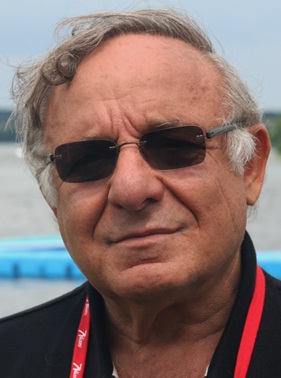
Dr. Isaac Adezis.
Let me start with the ‘bottom line’, with my conclusion: they are demonstrating in the wrong place against the wrong people.
Now, let me explain.
Most of the demonstrations have placards about greed, about how Wall Street companies and executives earn obscene sums of money while the country is truly suffering. American companies are awash in record profits while unemployment is at record highs. Something is genuinely not right… Right?
Yes, right, but what they are demonstrating against are the manifestations to the problem not the cause of the problem.
What is the cause?
The profit motive. That is where the problem is.
Imagine what would happen if medical doctors turn profit oriented and measure their success by profits. And medical schools taught them that profit should be their goal by which they should measure their success.
Many of us will die from unnecessary surgeries, go bankrupt from non ending medical bills or insurance premiums, and productivity of labor will go way, way down because we will be hospitalized to no end.
What does medical training say?
“Do no harm!!”
“The patient is first!”
Read more...

Our 2011 debate season has started!
We are in today’s issue of VilNews asking where the new ideas for Lithuania are. We have already received some answers and comments (see below) and would very much appreciate also your feedback and comments. Good debate is always healthy! Send your comments or suggestions by e-mail to editor@vilnews.com
Apparently you have no vision; your President is being knocked for standing up to the USA; and your young people are leaving in droves for better job opportunities and education in foreign lands.
I have been visiting Lietuva since 2003, before you joined the EU. Previous to that I had contacts with Lithuanians who spent their holidays in England. In those eight years I have seen Lietuva changing, going places, advancing, taking its place in the modern world. At the same time, my country (Britain) has been going down the pan.
Clearly corruption in public life is a problem in Lietuva, as it is in Britain. The difference is that Lietuva impeaches its politicians, whereas we literally let ours get away with murder. It is virtually impossible to have corrupt politicians removed from the British Parliament. The new British Government has promised reforms to remedy this situation, but as recent events have shown that corruption is endemic at all levels in both our Houses of Parliament, the chance of a swift adoption of anti-corruption measures is unlikely.
I’m English (of Swedish decent) so cannot speak for America where clearly most emigrants went to escape Nazi and Soviet domination in the 1930s and 40s. I suspect much of the economic migration of recent years is directed towards Britain, which is obviously cheaper to get to, and will let Lithuanians and Poles in without hindrance, unlike the US and other European countries.
Read more...
NEW DISCUSSION – FROM 8 MARCH 2011:
|
63% of Lithuanian women are
victims of violence
63.3 % of Lithuanian women have been victims of male physical or sexual violence or threats after their 16th birthday. This represents today such a severe problem for this country that, in my opinion, President Grybauskaite should personally get involved and take the necessary measures to turn around this devastating trend.
|
Grant Gochin
Violence is a natural byproduct of a society where brown is red, justice is ideological, the Prosecutors office is a haven of thugs, and people with PhD's in history can't read or write.
A society that values swastika's and acquits Stankeras is a society of hate and violence. Where is any misunderstanding?
Ieva Vozbutaite Dear Grant, a man allowing himself such statements, should base them on facts. Otherwise - it is merely splashes of ignorance on your part. I am a member of this society and with full responsibility I tell you that we dont value swastica or anything of the sort. As in any democratic nation, freedoms of speech and religion are allowed, which I admit, sometimes end in individual acts that are condemned by many. Your generalizations are inaccurate to say the least and I would hope you would know better.
Ieva Vozbutaite And... Lets not forget that Lithuanian women are also the most educated in EU... Conclusion: still many problems to be solved (give us a break - we only have 20 years under our belt), but with potential like that - beware :)
Aage Myhre Dear Grant and Ieva, First of all, is it ok for you if I publish this discussion in tonight's edition of www.VilNews.com? GRANT: I agree with Ieva that you are too rancid in your comment. I understand why you feel a need to react against the authorities and courts here, as they too often do not make their decisions based on honesty and common sense but instead let own interests prevail. But you must also not condemn an entire country and people in such a black and white background.
Aage Myhre
IEVA: I agree with you that Lithuania has a good basis for improvements. But I am also very disappointed that the young people, like you, have not taken over more of the governance of this country. You know as well as me that Lithuania will...
Ieva Vozbutaite Aage, you have my permission to publish my opinion. Also, I would like to draw your attention to what I think is misinterpretation of certain facts. 63% if you read the study have experienced violence AND/OR threat of such acts. it is, in my opinion, a little different then saying the first part and cutting the last... :)
Aage Myhre Might be... But if you read Dr. Giedrė Purvaneckienė's report at www.VilNews.com, i think you will agree with me that this is scary and deeply sad.
Ieva Vozbutaite Of course... and should not be tolerated...
Aage Myhre FYI, Ieva, Grant lives in California so it may take some time before we'll get his comments...
Ieva Vozbutaite March 8 at 1:53pm Report
Sending these links both to mr. Grant and Aage... Violence against women is a crime to be persecuted in all countries... I do hope that you both agree with me...
http://www.saynotoviolence.org/join-say-no/violence-against-women-israel-men-are-breaking-cycle
http://english.ntdtv.com/ntdtv_en/ns_me/2011-01-07/201404611186.html
violence against women in Israel: Men are breaking the cycle | Say NO - UNiTE
www.saynotoviolence.org
By Irit HakimSafe World's Israel correspondent reporting from Tel Aviv.IN MEMORY OF THE VICTIMSIn 2010, Eighteen Israeli women were murdered by their spouses or family members. This is the highest number since 2004.Each murdered woman carried a world of wishes, hopes, aspirations, loves, and dreams
Share
Zilvinas Beliauskas The USA ambassador to Lithuania Anne Derse says that "even such countries like the US and Lithuania" are still encountering this problem" and "Lithuania today occupies leader's position for women's rights" - http://www.alfa.lt/straipsnis/10720168/?JAV.ambasadore..smurtas.pries.moteris..ne.kulturinis.dalykas..o.nusikaltimas=2011-03-08_10-51

Audrius Simaitis
VilNews invites you to participate in a discussion about Lithuania's health care system.
Introduction by Audrius Simaitis,
Consultant Cardiologist at Royal Cornwall Hospital, UK.
One of the things that strikes one the most in Lithuania is the fact that management's mentality in the health care system has undergone little change since Soviet times. This is out of proportion in comparison with other fields like education and business.
Any outsider would immediately ask: why?
The answer most probably could be found comparing the State owned medical field with the predominantly private sector of odontology.
The State owned medical field is ineffective, tarnished by corruption. National and European surveys reveal the public in general is significantly dissatisfied. Physicians are happy neither with salary levels nor with working conditions. The emigration rates of the doctors are increasingly in worrying proportions.
Read more...
At least there was one
A number of years ago a friend in Vilnius, a well know musician, needed important surgery. So his musical colleagues help a benefit concert to raise the funds for his "free" medical care.. And to everyone's astonishment, the surgeon refused any payment (the rest took theirs) so at least there was one honest and honourable man.
David O’Rourke, USA
No mention of the rampant bribe-taking?
What, no mention of the rampant bribe-taking that goes on? That’s curious …
Gintautas Kaminskas, AUSTRALIA
Where are the new ideas for Lithuania?
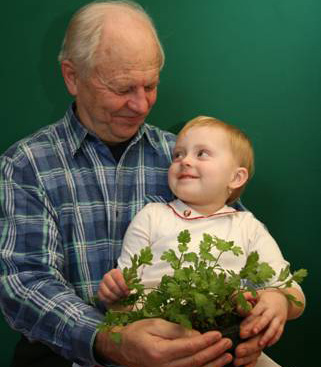
Lithuania is a country built on ideas. In my opinion, creativity is this nation's most fundamental natural resource. Through 800 years Lithuania has time after time been able to show the world that there is an underlying creativity and human power here that enables the country to rise again after even the most dramatic defeat or tragedy, again and again to take initiatives that lead to glory, fame and new opportunities for Lithuanians and individuals from other nations and cultures living here. Below some of the best ideas this nation has seen since the 1200s.
But where are the new ones? Where are the new business ideas? Where are all the young, sharp brains that again should bring Lithuania to fame and prosperity? "They have left their country and are now scattered around the world," you might respond. Yes, but so what? They are as good Lithuanians as anyone, and the Government should as soon as possible do whatever they can to facilitate for a new, global, brainstorming session with the aim to enter into a genuinely more progressive development phase here at home!
National priorities for Lithuania - a Canadian`s perspective

Professor Vic Pakalnis
I had a wonderful trip to Vilnius this past summer and I came away with a view of Lithuania that was full of admiration and hope. It filled me with pride that my parents were born there and that my DNA is tied to that corner of the world.
I have made a few observations of issues while I was there that I feel need to be addressed and discussed. While I am no expert on everything, I know mining, nuclear power, and the public service, so this is what I will share with you. Lithuania does not seem to have any natural resources; this is amazing to me, for all around Lithuania are countries with oil, minerals and industrial materials. Despite all of this, there is nothing major within Lithuanian borders. Either Lithuania is truly a barren place or you need some expertise in geological and mineral exploration.
We can help with this!
In Canada the largest mining show in the world happens in Toronto, Ontario. For instance, next week at the Prospectors and Developers Association of Canada (PDAC), the Lithuanian government could provide an incentive to mining developers, such as a tax break, and let them find the mineral wealth that likely exists in the land. The TMX (who operates our stock exchange) also finances over 70% of all mining deals in the world.
Canada can do good work with Lithuania, and I for one would love to see both our countries prosper.
Read more...
“You ask about new ideas for Lithuania? My only idea for all young people here is: Leave this country as fast as you can!”
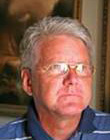
Aage Myhre, Editor.
She did not have much good to say about her homeland, the young woman who wrote to me yesterday. She is unfortunately one of very many who do not feel good about today's leaders or the administration, and she mentions specifically that she over the recent months was in regular contact with representatives of both the president and government, connected with her job, and that she came out from each of these meetings shaking her head. Another well-educated young professional in a good job that no longer sees great hope for the homeland.
Here as a bit more from what she wrote:
“Things here will not change in several generations.... Just look what is now happening with the municipal elections... Disgusting... I do not want to spend my best years waiting till those generations of leaders have changed... Yes, I want to help our people as much as I can... I have really tried, but... After some communication with our presidency lately, al I’m hearing and experiencing is how everybody is just looking for how to divide money between ministries and business holdings - no chance that life will be better here even in 10-15 years...Your article, your way of thinking - very good, but unfortunately utopian.... It should be done with this country as they do in the building industry - knock everything down (including media, that also in tight relation with the rulers), and then start from zero....
Lithuania has no VISION!
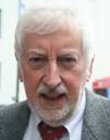
Jeff Lewis.
Lithuania has no VISION ! riddled with corrupt practice - offer to help and even friends take advantage, poor education standards , and poor quality of life. They leave to achieve a better qualification and job opportunity. Let each company linking with schools produce a common policy to address corrupt practice, energy conservation and its still icy underfoot in the countries capital...
Corruption is the major root of Lithuania's problems – an anti-corruption campaign is needed to foster a sense of national spirit

Gintautas Kaminskas,
Australia.
I have given a lot of thought to Lithuania's problems and have tried to figure out if there is on major root cause of most of Lithuania's problems. The word/thought that keeps occurring to me is CORRUPTION. I think that an anti-corruption campaign, if effective, would not only start to ensure that more litai or euros are spent the way they were supposed to be (and that more people start paying as much tax as they're supposed to be!) but it would have a unifying effect, fostering a sense of national spirit. Lithuanians have rallied together in the past in the face of external threats. Now they have to rally against the threat from within – corruption.
I have my own thoughts about how an anti-corruption campaign could be conducted, but I think it would be much better if Lithuanians in Lithuania would think about that and come up with a plan. Here's a concrete suggestion for you: why doesn't VilNews sponsor a function one day (or even two, weekend perhaps) at which such ideas could be 'brainstormed'? Call it a seminar, or even a 'brainstorming session', whatever you want. Corruption and how to eliminate or minimise it doesn't have to be the only topic. Maybe the theme of the whole function could be a question something like "What does Lithuania really need right now?". In my vision of such a thing, I would recommend that the findings or recommendations of the event should be written up and formally forwarded to both the Seimas and the President with a request for their reaction to it. At the same time the media should play a major role in making the recommendations/ideas known to the public, to stimulate discussion. It would be great if the media could then invite various people, either alone or in small groups (e.g. President, Prime Minister, other Ministers) to come and discuss these matters and to tell the public what they concretely plan to do about them. It's democracy in action, holding politicians, etc. accountable for their positions to the public that pays their salaries.
Gintautas Kaminskas
Australia
Two good debates from 2010
To give you a better idea of the debates we've had in the previous year, we reproduce below two articles and the subsequent response to these received from our readers:
|
Arrogance, ignorance and
an airport comparison
Arrogance and ignorance are not particularly positive characteristics of anyone, and I understand it well if some of our VilNews' readers, who see that I use these words together with a picture of our Prime Minister, predict that I will now be criticising him. So let me hurry to say that these two words are meant for all questionable behaviours seen performed by our governing forces since 1990, not solely for Mr. Kubilius. Read more...
|

Andrius Kubilius, Lithuania's Prime Minister
|
LACK OF COMMON SENSE BY PEOPLE POSITIONED AND TASKED WITH LEADERSHIP
Thank you Mr. Myhre for this copy and mostly for your gallant effort in pointing to the lack of common sense by people positioned and tasked with leadership in very important matters. After decades of Communist style living it is possible that the population has not yet regained clarity, confidence and with it the will to keep self serving arrogance out of ranks of the Nation's leaders.
Best regards,
Algirdas Vaitkus
Mission Viejo, California
I CONGRATULATE YOU ON YOUR COURAGE AND CLARITY
Dear Aage,
Bravo on an excellent issue. I congratulate you on your courage and clarity. Whether people agree or disagree with whatever point, I do hope many understand how much love, care and constructive friendship you are offering to your adopted country. Nothing can be better for a new democracy than a spirit of free civic debate and encouraging more and more local people to.... stay and debate!
Cheers
Dovid Katz
North Wales
THE NECESSITY TO DEVELOP A CULTURE OF MUTUAL TRUST AND RESPECT
Dear Aage!
Could not resist myself writing you and congratulating you for very good article! Enjoyed reading it!
It illustrates perfectly the Adizes management methodology (ref. www.adizes.com), which I am working with currently. It talks about necessity to develop a culture of mutual trust and respect within any organization in order to be successful (could be business organization or country). And one of the important elements creating such culture is willingness to hear and understand other people and other opinions.
You just provided a perfect example about the lack of mutual trust and respect in Lithuanian society! Very well done!
Best regards,
Virginijus Kundrotas
Kaunas
ANOTHER WELL-WRITTEN AND INFORMATIVE ISSUE OF VILNEWS
Hello Aage,
Congratulations on another well-written and informative issue of VilNews. The issues addressed speak for themselves.
I would like to bring to your attention another issue that you might like to look into, i.e. the subject of Lithuanian artists abroad. There is currently an exhibit at Radvilu Rumai Museum focusing on Lithuanian artists abroad. One of the featured artists, Danute Nitecki, is local to the San Francisco Bay Area, http://www.ldm.lt/RRM/Dovana_nepriklausomai_Lietuvai.htm
Danute opened her home to the local Lithuanian community this Easter for a 4th year in a row. Her biggest concern these days is finding a long term home for her art. I would bet that her concern is common to other Lithuanian artists living abroad.
Do you think that this is something the national government might like to address, or would it be better to approach local municipalities, or private organizations.
Best regards,
Algis Ratnikas
San Francisco, USA
WE SHOULD BE GLAD THAT OUR LEADERS HAVE BEEN FINANCIALLY CONSERVATIVE
Hi,
I am new to your newsletter, but I find your observations thought provoking, which is always good, whether one agrees or not, as it provides a basis for growth. So much in circulation in today's media is just fluff with little meaning or value.
One point in counterbalance. There is a lot of criticism of Lithuania's government, and while I agree that things could have been done better, we should be very, very glad that our leaders have been financially conservative, unlike the leadership of Vilnius, which has created huge debts for our children to pay, while goods and services were bought at inflated prices that helped cronies.
People look to the fantasy of the US and think that government can spend freely. The US is truly living in a fantasy world that works so long as they can convince foreign countries to hoard US dollars and keep them off the domestic US market. This option is not available for Lithuania. The result, sooner or later, is super inflation like what existed in Germany around 1923 when the taxi drivers purposely drove their fares by a bak so they could adjust the rate by the latest mark value. I myself have a couple billion marks from that time.
Iki,
Arturas Baranauskas
Vilnius
EASIER TO OBTAIN AN AUDIENCE WITH THE POPE,
THAN WITH A MINISTER FOR FOREIGN AFFAIRS OF LITHUANIA
Dear Mr. Myhre,
I enjoy your positive articles about Lithuania and send them to some 70 friends around the world. The less positive, I keep to myself.
You have lived long enough in Lithuania and must realize that many of the problems of the present day Lithuania are due to their reluctance to learn from the Western countries or accept advice from Lithuanians who lived and studied in the West. The relative success of Lithuania after World War I was largely due to the replacement of Russian educated officials by those who got their degrees in the West. My own father was the first Lithuanian with a degree in forestry from a Western university and introduced major reforms in the forest management, which survived even during the Communist occupation.
Alas, after 20 years of restoration of independence to paraphrase Kipling "The East is East, the West is West and the twain shall never (so far) meet". I spoke to a number of Lithuanians with degrees from top Western universities, who don't want to return to Lithuania - according to them, the "natives" know everything better.
I might add that for me it was easier to obtain an audience with the Pope, than with a Minister for Foreign Affairs of Lithuania.
Yours sincerely,
Ambassador Algirdas Zemaitis (ret.)
Vilnius – Rome
LISTEN TO SCANDINAVIAN ADVICE, NOT ARROGANTLY
ASSUMING THAT WE THE LITHUANIANS KNOW BEST
Hello Aage,
Hope you had a good Easter. I have just read the latest edition of VilNews, thank you for another good job. I agree with your editorial comments. In particular: "Being a Norwegian, I believe Norway and the other Scandinavian countries would have been willing to stretch to great lengths to provide help and advice for the crisis–hit Lithuania and the two other Baltic States. But they had to be asked. Our Lithuanian leaders should refrain from arrogance and avoid ignorance by seeking advice where good help and advice is to be found, domestically and internationally. Can they do that, there is every reason to foresee a bright future for this nation."
I have two comments to make on that. First, I believe that even now it's not too late to ask the Scandinavian countries for help. But you are exactly right: the Scandinavian countries would want in return a guarantee that whatever help they give will be used wisely, listen to Scandinavian advice, not arrogantly assuming that we the Lithuanians know best. Closely linked to this is the second thing: no one wants to give help if they think it's going to be wasted corruptly. Lithuanians need to be able to give the Scandinavian aid-givers a chance to supervise what is going on, the right to inspect and audit, to make sure that the aid is being used as agreed, and not to build the villas of mafiozai and corrupt politicians and public servants on land that they have misappropriated from public forests and lakefronts.
Which brings me back to my key theme (sorry if I'm repetitious): Lithuania will not make much serious progress until bigger efforts are made to stamp out bribery and corruption.
Best regards
Gintautas Kaminskas
Wollongong, Australia
"DUMMHEIT UND STOLZ WACHSEN AUF EINEM HOLZ".
Dear Aage,
Thank you for the fine arrogance story. Along the lines of your airport comparison, attached is another shameful blemish on the airport. I wholeheartedly agree that the airport is the first image of a country to the visitor. The dungeon like interior structure for processing the arriving passengers certainly doesn't leave much of an image.
I wrote a story in Draugas on robber like taxi fees from the airport to downtown Vilnius. Also that the taxicabs are drenched with nicotine odor and loud blaring Russian radio music listened by mostly Russian speaking taxicab drivers, causing my daughter to ask whether we really have arrived in Lithuania.
There is no cash pay-phone at the airport. To make even a local call one has to buy an expensive multiple call pay phone card, and how would a non-Lithuanian speaking visitor find out about that. Moreover, lack of an official non-commercial welcome and information center or booth to the arriving non-Lithuanian speaking foreigner is another striking example of not understanding the impact of an image that a foreign visitor receives.
On arrogance. Several months ago I had arranged a visit between the minister of energy and a CEO of an important nuclear reactor manufacturer. The meeting was supposed to be for the benefit of the minister on information of what is forthcoming in the future, particularly in small reactors and the possibility of establishing a European affiliate of the company in Lithuania.
The minister graciously extended an invitation to the CEO, but the minister's secretariat refused to extend even the slightest courtesy to this visit, such as picking up the visitor from the airport and transporting him to the meeting, setting up a meeting agenda, or even providing to the visitor's office the address of the ministry. They claimed that this was just another sales visit, and the visitor should take care of everything on his own. As a result the CEO canceled the meeting and eventually went to London. The European affiliate was established in the UK. Thus through such arrogance another opportunity was lost.
There is a lot truth in the German proverb "Dummheit und Stolz wachsen auf einem Holz".
Best regards,
Stan Backaitis
Washington, USA
SENDING E-MAIL TO LITHUANIA IS LIKE
SENDING IT TO THE BLACK HOLE OF THE UNIVERSE
Dear Aage:
I wish to ad another bit of advise to your fine article on Ignorance.
Lithuania's business people and government officials are yet to learn the necessity of good communications. Without a two way communication there is no possibility for further contacts. One of the most frustrating experiences I had was in e-mail (before that it was in regular "snail mail") communications. I would write and write but receive no reply (with only a few exceptions).
When I was working, our management had a rule - "answer all letters received in not more than three days. If there is no answer to be given, than at least acknowledge the receipt".
One of my American colleagues, who was sincerely trying to help Lithuania, said "Sending e-mail to Lithuania is like sending it to the black hole of the universe. Everything goes one way and nothing comes back". No wander he is now disenchanted and helping others.
Vytautas Sliupas, P.E.
www.aukfoundation.org
Burlingame, California
LITHUANIA'S BUSINESS PEOPLE AND GOVERNMENT OFFICIALS
ARE YET TO LEARN THE NECESSITY OF GOOD COMMUNICATIONS
Dear Aage:
I totally agree with Mr. Sliupas! [ref. his above letter] I once sent an e-mail to a Lithuanian who responded eight months later! And that is just one example -- there have been numerous others. Perhaps they just prefer face-to-face communication, but don't know how to communicate that to you :-).
Jennifer Lambert
USA
|
What can be done to improve Lithuania's
reputation to the rest of the world?
A reader who responded to our latest VilNews issue argues that we have begun to go in the footsteps of other Lithuanian media in describing Lithuania in a rather negative way. I can well understand such a reaction, but it must also be said that unfortunately there has been a relatively large number of cases and circumstances in this country that deserve to be described in quite critical terms, such as:
• Lithuania's economy and population, especially the weakest groups, are very hard hit by the economic crisis that has affected the world over the last couple of years, and one must be allowed to make critical remarks on how this country's authorities have acted in the handling of the crisis. It seems to me that Lithuania's government has been more concerned with finding their own solutions, trying to 'reinvent the wheel' rather than to learn from what other nations have made with regard to stimulus packages, lowered interest rates, etc. in these times of crisis, which in my view unnecessarily sets Lithuania several years back in time compared to many other countries. Read more...

|
|
Dear Aage,
I am an American-Lithuanian born in the US. My father was a 'DP' after the war, my mother was born in the US. My wife is Lithuanian-American and our four children speak Lithuanian. We have been active in Lithuanian-American post WWII immigration, activities all our lives. We lived in Lithuania 1992 -95 when I was a consultant for the US Treasury there at the Bank of Lithuania. You did "stick your neck out" in making the comments you did but I, for one, agree with you wholeheartedly. I think many others, particularly those who have lived both in Lithuania and outside the country, also agree.
The trick is, what to do about it or, for those of us living outside, why should we be concerned? As life goes on, roots are deepened overseas and Lithuania turns its back on us or makes no effort to either woo back the Diaspora, attract tourists or foreign investment (are these all culturally linked?) an "ace up Lithuania's sleeve" will be lost forever. To be sure, internally generated progress over the last 20 years has been great and the cultural life, in Vilnius particularly, makes life here in Cleveland, or almost anywhere else I can afford to live, pretty dull. Lithuania, however, given its precarious geographic position and small population needs to be exceptional in how it organizes itself and how it takes advantage of every scrap of resource (particularly human) that it can.
Good luck to you Aage.
Rimas Aukstuolis, Cleveland (American-Lithuanian)
Vice President Structured Trade Finance, Fifth Third Bank
|
|
Dear Aage,
Your critical comments on, and wishes for, Lithuania in this issue are excellent. I agree with every word, and can only hope that more Lithuanians would take your very informed, friendly, and insightful message to heart!
Best wishes,
Mykolas J. Drunga, Kaunas (American-Lithuanian)
Broadcaster at Lithuanian State Radio
|
|
Hello and better year 2010!
I agree 100 % with you about the thesis you wrote in this issue of the journal. Things in reality are exactly as you clearly and straight have written. The reason why you often get critics is the limited knowledge of short-term "visitors", such as business consultants, diplomat crops, coming here for some years and then trying to make a picture from official Lithuanian sources or lousy press articles. I think especially you and partly me (14th year passing here) with our good touch with local population, business-life, some understanding of language and Scandinavian background, values, are looking around without coloured spectacles. Still, almost every day on, with one's private and business life meet corruption, centralization of business (Rubikon, VP etc) and pre-agreed tenders, cartels.
Lithuania has got a lot of very good opportunities to become one of the success stories in Europe for agriculture, tourism, ITservices, leading harbour country by the Baltic Sea etc. but the style must be changed as you say.
Thanks, Aage, for your brave and honest articles earlier, now and in the future.
Krister Kastren, Klaipeda (Finnish)
|
|
Dear Aage,
Many thanks. That is a beautiful piece of writing and a well laid out story perfectly befitting the January 13th. May I have permission to send this to the Lithuanian daily 'Draugas' for publication in Lithuanian and 'Bridges' for publication in English?
Best regards,
Stasys Backaitis, Washington dc (American-Lithuanian)
|
|
Dear Aage:
Many thanks for writing your Chronicle of Lithuania!
We, Lithuanians in diaspora or in Lithuania itself, should be very grateful and obliged to Great Friends of Lithuania like you!
With all due respect, I believe your criticism is too mild though. Unfortunately, the "inconvenient truth" is that the Soviet communist nomenklatura has hijacked Lithuania's development in the last almost two decades and, consequently, our country has largely horribly wasted a truly impressive and immense political and economic capital of global good will, so excruciatingly hard earned by the Victims of the January 13th, 1991 brutal Soviet aggression and by the blood and brains of the legendary Lithuanian freedom fighters, world renowned anti-communist dissident movements, and political refugees in the West in the post-WW II years.
Wishing you all the best for 2010 and beyond, I remain
Yours sincerely,
Valdas Samonis, PhD, CPC (Canadian – Lithuanian)
The Web Professor of Global Management(SM)
|
|
Hi Aage.
Scary reading, but nevertheless correct, unfortunately.
Well and brave done!
Best regards,
Arthur Simonsen, Vilnius (Norwegian)
|
|
Responses to VilNews 7 January
|
|
Email 1 from Mr. Andrius Pauga, Consellor at the Embassy of Lithuania in Portugal:
Dear. Mr. Myhre,
Again and again, negative information prevails in your newsletter, as if nothing good happens in Lithuania (except road fatalities down). Even the Capital of Culture is described as a failure. I am very disappointed that you follow this bad tradition of Lithuanian media. Another thing: two Lithuanian ministers are criticised in the first article, many quotes of their critics, but no quote of any of the ministers. That's really partial.
Email 2 from Mr. Pauga:
Thank you for your answer. I fully agree with you that telling truth is of utmost importance. What I am very concern about is that Lithuanian media (perhaps 90 percent of it) for many years keeps trying to pre-select the truth, to manipulate with truth - not only by giving most of attention to negative facts, but also by constant devaluating and depreciating any positive facts or developments in our country. What we have as a result is a prevailing negativism and lack of patriotism among Lithuanians, and this is worse than any economic crisis. I am deeply convinced that the mission of mass media is to form our society in a positive way, to help our people to discover real values, to teach them how to love their country, to help them to understand finally that there is no better place in the world for Lithuanians (and maybe for some expatriates as well) than Lithuania.
I really hope that your newsletter, while being addressed more to international than local readers, will notice and discover all the colours of Lithuania, not only dark ones. I am looking forward to read next issues of it.
By the way, have you heard that, according to 2010 Quality of Life Index published by the "International Living" magazine (http://www1.internationalliving.com/qofl2010/), Lithuania is 21-st country among the best in the world, with better quality of life than most other countries of Central and Eastern Europe (and even ahead of some countries in Western Europe). Even if this is just one of ratings, it is a good example that many Lithuanians still don't understand they are blessed by having been born here. I wish you every success in your journalist work and all the happiness for your family.
Sincerely,
Andrius Pauga, Lisbon (Lithuanian)
Consellor at the Embassy of Lithuania in Portugal
|
|
Hi Aage,
My guess is that most of the people who have complained about the newsletter are probably people in the Lithuanian government.
Of course, they themselves are not angels when it comes to manipulating media, and the very fact they are complaining directly to you only shows that they are exerting pressure so that you fashion a message that justifies the institutional bullshit they tell themselves and that they want everyone else to buy into. This is a problem not just in Lithuania, but it is still a Lithuanian problem.
On this topic, two quotes bear remembering:
"Propaganda is to a democracy what the bludgeon is to a totalitarian state." Noam Chomsky, the famous MIT linguist.
"Political language -- and with variations this is true of all political parties, from Conservatives to Anarchists -- is designed to make lies sound truthful and murder respectable, and to give an appearance of solidity to pure wind." George Orwell
Darius Ross, Vilnius (Canadian-Lithuanian)
Journalist
|
|
Dear Darius,
Believe me, I have not received a single negative comment or complaint from anyone in the government or from other Lithuanian politicians. If to be even more precise, I have not received any comments from that side, at all….
Aage
|
|
Dear Aage,
Greetings and best wishes from Virginia.
Aage I think telling as you see it should be a good example to Lithuanian news media and political commentators. The Chronicle you wrote is excellent. You have done a great job and should be proud of it. I tend to agree with Valdas Simonis, PhD that your criticism of things that are not right are too mild if anything. I wish you continued success.
Jonas Kronkaitis, Virginia USA (American-Lithuanian)
Brigadier General, former Commander of Lithuania's Armed Forces
#
|
|
Dear Jonas and Valdas Simonis,
I cannot completely agree with you that my criticism has been too mild. I know very well that there are also among today's Lithuanian politicians individuals who really want to do their very utmost to contribute to better conditions and a more positive development for this country, so I have not wanted to be too harsh or drastic when I first decided to make my views known. I hope however that my comments and the ensuing debate may have some positive impact.
I also can not totally agree with you, Valdas, that the Soviet-inspired 'nomenclature' here has 'hijacked' Lithuania's development. It was rather the freedom movement Sajudis that 20 years ago was able to take over the ship from the Soviet nomenclature that until then had ruled Lithuania. Unfortunately, it soon turned out that the new crew was too young and inexperienced to get the ship on a steady course towards the west as the plan had been. This was further exacerbated when the new crew's intended pilot, Stasys Lozoraitis did not reach up when the Lithuanians in 1993 held its first presidential election, and then died so tragically just a year after. The Sajudis' barricade-captain who became famous when he gathered his people to quietly protests over the mighty Soviet power in 1991, quickly gained reputation for being too intellectual and artistic to be able to steer the ship, and even his own crew began gradually to mismatch in all directions.
As is well known, the winner of the election in 1993 was the former Communist leader Algirdas Brazauskas, who apparently let the ship continue its course towards the west, but now in a rather leisurely pace. The reduced speed gave the ship's former owners a good opportunity to come aboard to destroy all the old log books, and it also gave the new captain and his closest officers plenty of time to fill their pockets with different gems and precious stones from the many dinghies around that needed the mother ship's favour. A lot of the originally small vessels learned quickly how they could grow at the expense of other small boats, and they also learned how much they had to pay to the mother ship's officers to look the other way when the smaller vessels were robbed.
The Sajudis crew who had represented so much of hope of a steady course and a better future for Lithuania in 1990-91 became older and disillusioned, with ever-new factions and officers. None of them succeeded in convincingly show their abilities to take over management of the ship, while the nomenclature crew on the other hand used the time well to take positions and places that they retain to this day. Still, the ship and the fleet around it proceeded slowly forwards, until finally also the nomenclature captain reached the age of retirement. None of his former top officers convinced as he had done.
Then came the year 2008, and the ship again got a captain and a crew with roots in the original Sajudis crew. Unfortunately for them, the wind had increased sharply exactly when they took over, and they have since been forced to fight a terrible storm that still has not settled. Many small boats, especially the oldest and weakest ones, have already capsized and disappeared in the waves, often because the mother ship has not provided them with fuel and provisions but rather has sought to rescue the mother ship. Fortunately, there has during this time been more experienced larger vessels and fleets from Western countries nearby, and many ask themselves today why the new crew of the Lithuanian mother ship has not been much more willing to ask for help and supplies from these even when the number of small boats that capsized was tragically high. Meanwhile the old ship owners have taken advantage of the situation by seemingly reaching out a helping hand to many of those who already 20 years ago doubted whether Sajudis' route to the west was the best choice.
But the journey is not over, so maybe there is still hope for a steady course and an open attitude from the now one year old crew to learn from and seek help and assistance from more advanced ships and barges farther west and to work hard to develop leadership skills and attitudes that can make a true change to the better for the people of Lithuaniar?
13 January 1991 was a day of triumph for Sajudis, why not pick up the baton?
Aage
|
|
Dear Aage
I have found your article and the responses I have seen so far quite fascinating.
At first I wondered why you had written it. Generally you are writing to an expat communtity and are we a force for change or does hope spring eternal?
But on reflection I can see the merit of such a discussion.
I have worked and lived here for only some 10 years, rathes less than you. Ten years ago I was hugely concerned that amongst the 3 Baltic States Lithuania was the most entrenched in its old ways and the most reluctant to change. But I still fought hard to preserve my firms's investment and continuing investment in Lithuania as one day "they would get it right".
Sadly 10 years on "they" have not and my initial fears have proved right. Yes, professional firms (such as my own former firm) have managed some reasonable growth and pretty marginal profitability but no where near the advancement that should have been possible. But the culture of political governance has changed very little if at all. And this has constrained the development of a proactive and sustainable business culture.
Lithuania is short of natural resources (apart from timber and fresh water). Its main potential economic resource is its people. And if properly lead by quality politicians, good business leaders and a forward thinking educational system that could mean a lot. Lithuanians have a reputation as being hard working and diligent. But sadly their reputation as "ëntrepreneurs" is better known as thieves of one sort or another.
What is lacking is LEADERSHIP.
I speak of political leadership which cares for the development of the country rather than politicians' own wallets. (Just look at the energy crisis now facing the country. This was forseeable at least 10 years ago. Various solutions were proposed THEN but no action taken – probably because political leaders could not agree on how to share out the "goodies".)
I have spoken to many people (including my wife!) with strong political views (with which I may or not agree – but that is not the point). But when I say why don't you get diretly involved in politics? They wan't no part of it – the political system has no credibility.
In terms of business leadership of Lithuanian companies, with a very few exceptions, I see a serious lack of role models for the budding entrepreneur. The young people I speak to do not see any future in joining a Lithuanian company as a route to developing a career. They would prefer to look overseas. And I also see the major shareholders of successful Lithuanian companies uprooting their investments away from Lithuania as they do not see their future potential as being encouraged here.
I am also concerned that the educational system is weak in terms of its business training . I come from the UK and was Treasurer of a significant university and on the Board of a major business school. We strived for good involvement of businesses from all spheres (banking to manufacturing, Japanese, German, even American) and generally achieved it. My attempts in Lithuania fell on deaf years.
So Aage, I generally agree with your sentiments and those of some of your respondents.
You are short on solutions as I think are most of us who care about Lithuania, especially in the short term. But the long term requires strong, ethical and transparent leaders in all aspects of political and business life. Where will we find them?
I would welcome any comments.
Good luck!
Hugh Tomas, Vilnius (British)
Former Senior Partner of PriceWaterhouseCoopers
|
|
Lithuania's way of treating their people living abroad (VilNews 13 January)
|
|
I am one of those Lithuanians whose family emigrated to the United States in the aftermath of World War II. My parents sent us to Lithuanian school every Saturday, so that we grew up reading, writing, and speaking the language fluently. This makes my trips to Lietuva so much more pleasant. I can relate to my cousins, I can make new friends, and I appreciate the history. On one of my visits to Lietuva, I noted that there is a definite prejudice against American-Lithuanians such as myself. You noted that the indigenous Lithuanian people need to appreciate what the diaspora has done in terms of raising support and goodwill worldwide. I wholeheartedly agree, and I appreciate your opinions.
Viso gero,
Jurate Burns, Destin Florida USA (American-Lithuanian)
Destin Library Director
|
|
Dear Jurate,
Sorry to hear, but as I said in my comment article;
'One of Lithuania's most prominent human resources is undoubtedly the country's large diasporas around the globe, groups of people and their descendants who left their mother country because of war, difficult economic conditions, political persecution, etc. These diaspora groups are in my view too little listened to or consulted from the Lithuanian authorities, which is very sad for a nation that so desperately needs all possible support and assistance from the hundreds of thousands who still have Lithuania in their hearts.'
Let's see what we can do to change this kind of attitude from authorities and common people here…
Aage
|
Good morning world – this is VilNews Lithuania!
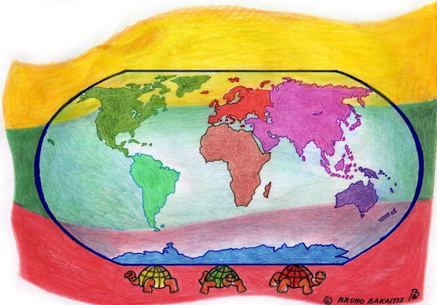
VilNews is a brand new, online e-magazine that offers:
FRESH NEWS, BLOGS AND COMMENT ARTICLES FROM AND ABOUT LITHUANIA AND LITHUANIAN MATTERS AROUND THE GLOBE
It was in September 2001 – almost ten years ago – that our Vilnius International Club (VIC) held its very first meeting, in a Vilnius Old Town pub.
Not long after that we began publishing a bashful little newsletter for our members. It soon turned out that our writings achieved great popularity, even outside the borders of Lithuania, and in 2010 we experienced that our VilNews newsletter reached an audience of 10 000 - 15 000 readers for most of the weekly releases, reaching absolutely all corners of the world...
It was against this background that last autumn we decided to turn the newsletter into an online e-magazine. And here is the result!
We are proud to offer no less than 24 sections with an infinitely great variety of articles, comments, photos, online booking of hotels and travel, extensive news archives, and much, much more.
We are still in an early phase, so there will certainly be errors and omissions, but we will improve ...
We have been very pleased to see the amazingly great support that we have received from our readers, writers and contributors, from around the world, and this fact makes us confident that we will establish and continue to develop VilNews' position as the world's leading English-language e-publication from and about Lithuania! Our goal is to have a readership minimum of 100 000 persons worldwide by the end of 2011.
Please help us achieving exactly that by letting your friends and acquaintances know about VilNews.
Maybe you want to read some of our VilNews newsletter issues from 2010?
In such case, just click on the below images:
 |
A cavalcade of VilNews 2010
(you get up the articles by clicking on the below front page images) |
 |
2010

CHRONICLE
OF
LITHUANIA
|
|
8 JAN
.jpg)
WOUNDS OF HOLOCAUST
|
13 JAN
.jpg)
LITHUANIA'S REPUTATION
|
18 JAN
.jpg)
VILNIUS CHANGES YOUR SOUL
|
22 JAN
.jpg)
NEW IDEAS
FOR
LITHUANIA?
|
26 JAN
.jpg)
NUCLEAR
FEAR
|
28 JAN
.jpg)
TIME
TO LEAVE?
|
|
1 FEB
.jpg)
LET'S BUILD A NEW TOWN!
|
3 FEB
.jpg)
THE TWO
BIG BENS
|
5 FEB
.jpg)
BUKIME
KARTU
|
8 FEB
.jpg)
A POLITCAL ERA DRAWS TO AN END
|
16 FEB
.jpg)
A LITHUANIAN PRESIDENTIAL PALACE
|
22 FEB
.jpg)
LITHUANIA'S GOOD / EVIL
|
|
25 FEB
.jpg)
LITHUANIA IS THE PLACE TO GO IN 2010!
|
1 MAR
.jpg)
CALIFORNIA LOVE LETTER
|
5 MAR
.jpg)
KAZIUKAS
FAIR
|
8 MAR
.jpg)
VIOLENCE AGAINST WOMEN
|
11 MAR
.jpg)
20 YEARS OF INDEPENDENCE
|
15 MAR
.jpg)
THE
HOLY GRAIL
|
|
21 MAR
.jpg)
CONNECTING PEOPLE
|
23 MAR
.jpg)
NAIVE
FOREIGNERS
|
25 MAR
.jpg)
SPRING IN LITHUANIA!
|
27 MAR
.jpg)
WOLLONGONG REFLECTIONS
|
1 APR
.jpg)
UZUPIS INDEPENDENCE DAY
|
3 APR
.jpg)
EASTER
MAGIC
|
|
4 APR
.jpg)
EASTER TRADITIONS
|
6 APR
.jpg)
ARROGANCE, IGNORANCE & AN
AIRPORT...
|
8 APR
.jpg)
ECONOMIC CRISIS
|
12 APR
.jpg)
LITHUANIAN FOOTPRINTS
|
16 APR
.jpg)
LITHUANIAN SOUTH AFRICA
|
21 APR
.jpg)
VILNIUS ARCHITECTURE
|
|
26 APR
.jpg)
LOOK TO NORWAY!
|
3 MAY
.jpg)
FLOWER
POWER
|
9 MAY
.jpg)
LITHUANIA'S PARTISAN WAR
|
11 MAY
.jpg)
LITHUANIAN PRESIDENT OF COLOMBIA?
|
14 MAY
.jpg)
BUKIME
KARTU
|
17 MAY
.jpg)
DO UNTO OTHERS
|
|
24 MAY
.jpg)
LITHUANIA –
A HAVEN OF TOLERANCE? |
3 JUN
.jpg)
SOUND OF MUSIC!
|
5 JUN
.jpg)
TEAR DOWN THIS WALL!
|
7 JUN
.jpg)
THE VILLAGE VOICE
|
14 JUN
.jpg)
VERITAS ODIT MORAS
|
17 JUN
.jpg)
LETTERS
FROM KYRGYZSTAN |
|
23 JUN
.jpg)
SU JONINĖM!
|
26 JUN
.jpg)
JEWISH CULTURE RETURNS
|
30 JUNE
.jpg)
THANK
YOU!
|
2010
.jpg)
CHRONICLE
OF
LITHUANIA
|
JANUARY - JUNE
2010
|
July – December 2010
|
10 JULY
.jpg)
MISS MARPLE
|
16 JULY
.jpg)
BATTLE OF GRUNWALD
|
19 JULY
.jpg)
ECONOMY
AT A
TURNING POINT?
|
30 JULY
.jpg)
KLAIPEDA SEA FESTIVAL
|
9 AUG
.jpg)
TWO
GRUMPY
OLD MEN
|
16 AUG
.jpg)
JONAS SLIUPAS
|
|
30 AUG
.jpg)
SUMMER SUMMARY
|
10 SEP
.jpg)
INK OF THE SCHOLAR
|
15 SEP
.jpg)
INCREDIBLE INDIA!
|
21 SEP
.jpg)
VILNIUS INTERNATIONAL CLUB
|
24 SEP
VilNews
VILNEWS WILL BECOME AN
E-MAGZINE!
|
28 SEP
.jpg)
BACK TO
THE USSR!
|
|
11 OCT
.jpg)
THE NEW WORLD ORDER |
18 OCT
.jpg)
LITHUANIANS OF THE WORLD, UNITE
|
26 OCT
.jpg)
ALL SAINTS' DAY
|
3 NOV
.jpg)
THE SNAIL MAN
|
11 NOV
.jpg)
CRIME
&
DECAY
|
16 NOV
VilNews
VILNEWS
E-MAGAZINE UPDATE
|
|
22 NOV
.jpg)
CHRISTMAS BAZAAR
|
30 NOV
.jpg)
VILNEWS WRITERS
|
11 DEC
.jpg)
EXPATRIATES
IN LITHUANIA
|
12 DEC
.jpg)
HEALTH & WELLBEING
|
13 DEC
.jpg)
LITHUANIA IN THE WORLD
|
14 DEC
.jpg)
OFF THE BEATEN
TRACK
|
|
15 DEC
.jpg)
TRAVEL LITHUANIA!
|
16 DEC
.jpg)
LITVAK FORUM
|
17 DEC
.jpg)
IS THE ROUBLE RUSSIAN?
|
18 DEC
.jpg)
HOTELS & RESTAURANTS
|
19 DEC
.jpg)
LITHUANIA TODAY
|
20 DEC
.jpg)
FOOD, WINE AND MORE...
|
|
21 DEC
.jpg)
REAL ESTATE, CONSTRUCTION
|
22 DEC
.jpg)
CHRISTMAS IN SIBERIA
|
23 DEC
.jpg)
HISTORICAL LITHUANIA
|
31 DECEMBER
.jpg)
VilNews 2010
|
JULY – DECEMBER
2010
|
|
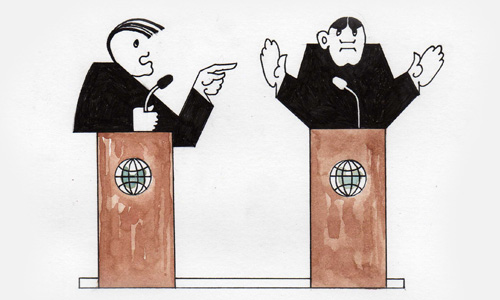


 Click on the buttons to open and read each of VilNews' 18 sub-sections
Click on the buttons to open and read each of VilNews' 18 sub-sections 



























































































.jpg)
.jpg)
.jpg)
.jpg)
.jpg)
.jpg)
.jpg)
.jpg)
.jpg)
.jpg)
.jpg)
.jpg)
.jpg)
.jpg)
.jpg)
.jpg)
.jpg)
.jpg)
.jpg)
.jpg)
.jpg)
.jpg)
.jpg)
.jpg)
.jpg)
.jpg)
.jpg)
.jpg)
.jpg)
.jpg)
.jpg)
.jpg)
.jpg)
.jpg)
.jpg)
.jpg)
.jpg)
.jpg)
.jpg)
.jpg)
.jpg)
.jpg)
.jpg)
.jpg)
.jpg)
.jpg)
.jpg)
.jpg)
.jpg)
.jpg)
.jpg)
.jpg)
.jpg)
.jpg)
.jpg)
.jpg)
.jpg)
.jpg)
.jpg)
.jpg)
.jpg)
.jpg)
.jpg)
.jpg)
.jpg)
.jpg)
.jpg)
.jpg)
.jpg)
.jpg)
.jpg)
